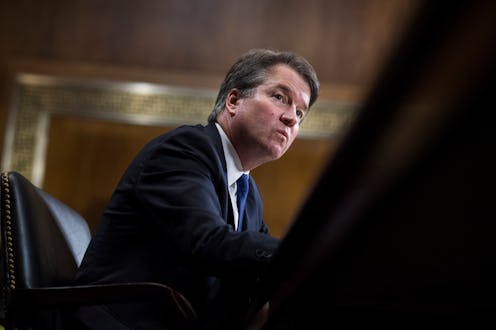News
This Is What Kavanaugh Might Have To Do If SCOTUS Takes Up A Sexual Assault Case

The confirmation of Brett Kavanaugh to the U.S. Supreme Court raises serious questions about the type of cases he'll preside over — namely, whether Kavanaugh will recuse himself from sexual assault cases. The Senate confirmed Kavanaugh to the nation's highest court on Saturday afternoon, following sexual misconduct allegations from three women. While the allegations could create a conflict of interest, it's typically up to a Supreme Court justice to recuse themself from a specific case.
Christine Blasey Ford testified before the Senate Judiciary Committee last week that Kavanaugh attempted to sexually assault her in the 1980s. Deborah Ramirez alleged that he exposed himself to her in college. And Julie Swetnick accused the judge of "targeting" girls in high school. Kavanaugh has repeatedly denied every allegation.
Still, the heated debate over said allegations could put Kavanaugh in a tricky position down the line. "Any conflict of interest can theoretically disqualify a judge," according to the nonpartisan nonprofit the National Constitution Center. Though current precedent dictates that a justice decides when to recuse themself from a case, a party in a particular case does have the right to submit an affidavit claiming the judge in question has "a personal bias or prejudice." As the National Constitution Center notes, the justice can then either agree to sit the case out or refuse.
Because the allegations against Kavanaugh were made public, he could be pressured to recuse himself from sexual assault cases. But it's more likely that he'll be asked to recuse himself from cases involving congressional Democrats. As Laurence Tribe, a professor of constitutional law at Harvard Law School, wrote in The New York Times:
His intemperate personal attacks on members of the Senate Judiciary Committee and his partisan tirades against what he derided as a conspiracy of liberal political enemies guilty of a "calculated and orchestrated political hit" do more than simply display a strikingly injudicious temperament. They disqualify him from participating in a wide range of the cases that may come before the Supreme Court: cases involving individuals or groups that Judge Kavanaugh has now singled out, under oath and in front of the entire nation, as implacable adversaries.
Rep. Jerrold Nadler (D-NY) agreed, telling ABC's This Week that the judge's angry testimony before the Senate last week meant Kavanaugh recusing himself from cases involving congressional Democrats would be the "proper thing."
When it comes to sexual assault cases — which the court doesn't hear very often — Tribe noted in The Times that some may also argue that Kavanaugh needs to recuse himself. Though the court doesn't determine whether a person is guilty of sexual assault, it can dictate how these cases move through the courts. Most sexual assault cases heard by SCOTUS in the past focused on the constitutionality of a specific court practice or who can be held liable in one type of sexual assault case.
At the end of the day, Kavanaugh will likely hold the power to decide when to recuse himself — not matter what the case in question involves.
If you or someone you know has been sexually assaulted, call the National Sexual Assault Telephone Hotline at 800-656-HOPE (4673) or visit online.rainn.org.
Read More About Brett Kavanaugh's Confirmation
The Reason Supreme Court Justices Serve For Life Is Right In The Constitution
This Is How Your Senator Voted On Brett Kavanaugh
SCOTUS Justices Can Be Impeached, But That Doesn't Mean It'll Happen To Kavanaugh
Opinion: "Believe Women” Means Nothing If You’re Not Doing Anything About It